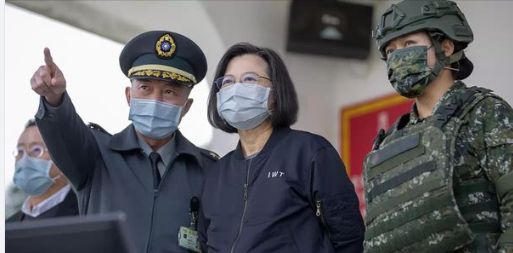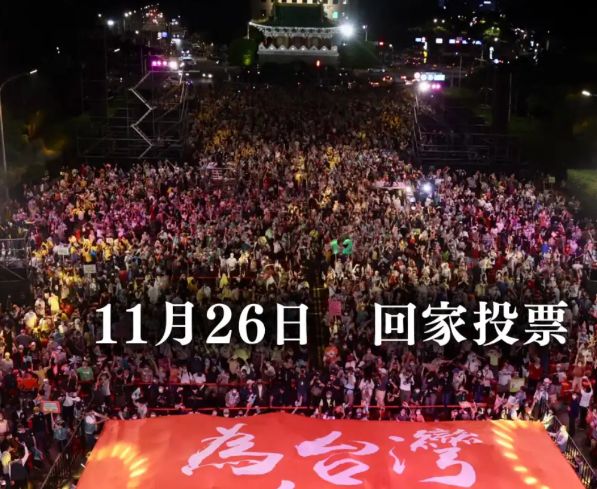By Eric Vandenbroeck
and co-workers
What Made Taiwan Understand How Perilous
This Situation Is
Today China
mounts large-scale joint strike drills around Taiwan, sending
28 warplanes and naval ships to the island days after a US Navy destroyer
went through the Strait But the war would leave China’s navy in shambles
and tens of thousands of Chinese soldiers and prisoners of war.
Taiwan’s local
elections shocked the ruling Democratic Progressive Party (DPP) as it
experienced its worst
performance ever
and ended up with control of only five of Taiwan’s 22 counties and cities. The
defeat was even more damning, considering that President Tsai Ing-wen had
highlighted China as a threat and urged the public to vote for the DPP to send
the world a message. It was a line that helped Tsai win two presidential
elections in a row—but the problem with making every election a referendum
on Beijing is that eventually, the public gets numbed, especially when the
party itself doesn’t seem to be taking defense as seriously as it should.
Unfortunately, many
Taiwanese still don’t seem to grasp how perilous their situation is. An August poll, taken after menacing Chinese military
drills in response to
then-House Speaker Nancy Pelosi’s trip to Taiwan, found that only 39 percent of
Taiwanese adults said war was very or somewhat likely, while 53 percent said it
is not very possible or doubtful. Taiwan is starting to wake from its slumber —
but some people still prefer to hit the snooze button.
Their attitude
reminds me of many Ukrainians, including President Volodymyr Zelensky, who
denied right up until the last moment that Russians would invade. While the
Ukrainians have proved themselves to be stout and skilled defenders, they
failed to deter an aggressor and thus to avert a war that is now ravaging their
country. That is a mistake Taiwan must not make. Taipei has made a good start
toward rebuilding its defenses, which atrophied after the end of martial law
and the Cold War in the 1990s, but it still has a long way to go — and not much
time to get there.
But the war that
everybody knows will come would leave China’s navy in shambles and tens of
thousands of Chinese soldiers and prisoners of war.

Some have argued that
the DPP’s defeat was a repudiation of its China stance, while others have
pointed out that local elections mainly cover domestic
issues. There is truth in
both arguments, but what is clear is that the results exposed severe problems
with Tsai and the DPP. Tsai has been eager to confront China but has avoided
taking on the domestic costs of hardening Taiwan’s defenses. This contradiction
has come back to bite her.
The main opposition
Kuomintang (KMT), already held most cities and counties from the previous
elections in 2018. Still, the DPP did not expect to get blanked in the
economically and demographically vital north, losing all of its existing city
mayoralties and the central and east.
In an attempt to
galvanize voters, Tsai gave a speech at a large rally just two days before the
election, highlighting the threat of China and urging the public to vote for
her party to “stand up for
Taiwan.” Hundreds of DPP
candidates signed a pledge to “resist China” and “never
surrender.” But in the end, the KMT won big.
Tsai’s “protect
Taiwan, resist China” position was successful in the past, but it failed this
time. Surveys show that the Taiwanese are still deeply worried about China and
have overwhelmingly negative feelings about Beijing. Apathy drove the results,
not a sudden love or lack of concern about the mainland. And that widespread
public apathy, even resignation, about national defense stems from the DPP
government’s colossal discrepancy.
Since coming to power
in 2016, Tsai has refused to
agree to the 1992
Consensus, which China’s government sees as necessary for any talks. As a
result, there have been no official high-level interactions between the two
sides in the past seven years. During this time, China has warned Taiwan
against seeking “independence” while increasing its military buildup and
activity. Tsai has responded by striking a defiant tone and speaking out
against China, as have her cabinet officials. Taiwan has also increased
military orders from the United States while welcoming visits from U.S.,
Japanese, and European politicians.
However, Taiwan’s
government has been reluctant to inform the public about the seriousness of
tensions, such as the possibility of war and the preparation and sacrifices
that people would need to make. They talk about China as an enemy but don’t
discuss the case of war and the gifts the public would need to make. Until
recently, the government had also failed to make preparations such as carrying
out civilian defense training or extending the four-month conscription.
The government has
been unable to resolve long-standing problems in the military with logistics,
training, and manpower, such as shortages in pilot retention and troop recruitment. A big part of this is an expectation that the United States
would intervene quickly to
help Taiwan in case of war with China. But that has caused much of the
Taiwanese public to view a fight with China either as an inevitable defeat or a
U.S.-carried victory—not as something they can get involved in themselves.
To some degree,
Ukraine changed that, with some Taiwanese voluntarily signing up for defense classes. However, the government has
been slow to act. Although it extended reservist training from one week to
two earlier in 2022, it was only a trial for 15,000 reservists, meaning the majority of
reservists last year, more than 95,000, still underwent one week of training.
In 2023, the two-week exercise will be applied to 22,000 reservists but not to
the other 97,000 reservists who will still do one week.
The government also
announced on Dec. 27, 2022, that it would extend
conscription for
young males from the current four months, which has been widely derided as useless, to one year. However, this will only start in 2024
and only for men born in 2005 and after, meaning that all men over 19 who
do their conscription in 2024 will still do just four months. The government
had been talking about this since at least March of last year after Russia invaded Ukraine in
February. Still, the authorities dragged their feet in announcing by waiting to
do it at the “end of the
year,” presumably to avoid
upsetting voters before the Nov. 26 local elections.

National politics are
shaped by national identity and how to deal with China, and the DPP currently
has a significant structural advantage. However, there is no Taiwanese or
Chinese way to pave a road or subsidize false teeth, so the KMT is not
necessarily disadvantaged in local politics.
Because of the KMT
wave in 2018 (which was powered by Tsai’s awful approval ratings), half of the
races featured a KMT incumbent running for re-election, most in either a
DPP-leaning or a toss-up area. Incumbents usually win re-election, and almost
all of this cohort had high approval ratings. The open seats were primarily
fought in cities and counties that historically lean toward the KMT. While it
is surprising that the KMT won so many contests, no single outcome was
particularly unexpected.
If this outcome was
not anomalous, neither did it mark a shift. Neither side has a structural
advantage in local government, so there is no reason to think that the KMT will
do so well in the future when it does not have a bevy of popular incumbents or
such a good map for open seats.
What Does The Election Of Chiang Wan-An (Also Known As
Wayne Chiang) As The New Mayor Of Taipei Portends For The KMT’s Strategic
Positioning In National Politics?
China is inevitably
an important topic in national elections, and the KMT has painted itself into a
corner on this issue. The KMT is still stuck with the electorally unviable 1992
Consensus (one China, each side with its interpretation) as the cornerstone of
how to deal with China. The PRC insists that the 1992 Consensus is simply one
China (the PRC), so the DPP is now seen as the party defending the status quo.
The KMT has proven
unwilling or unable to move to a new position through internal party
mechanisms. Suppose it is to adopt a new, more electorally competitive stance.
In that case, it will have to be dragged there by a party member running in
general elections and appealing to the median voter. Chiang is one of only a
few KMT figures with the potential to do this.
It is unclear whether
Chiang has the desire, vision, charisma, or guts to take on such a challenge.
Thus far, his political career has been marked more by amiably going along with
the party mainstream than boldly demanding others follow his lead. However, as
mayor of the capital, he will eventually have to take a stance on how to deal
with China. How Chiang handles this – as well as how well he handles all the
more mundane tasks of city government – will determine whether or not his
election marks a significant milestone for the KMT or whether he is merely
another forgettable local politician.
Is President Tsai Now A Lame Duck? Is The DPP Transitioning
Into A Post-Tsai Era?
Yes and no. Tsai is
no longer the party chair, so she will be far less able to tamp down party
infighting, influence nominations, or invoke party discipline to pass
controversial items. She will also be less active in domestic policy matters.
Vice President William Lai will almost certainly take over as DPP chair and is
the most likely person to win the next presidential election, so that power
will gravitate toward him over the next few months.
That said, Tsai will
still exercise all the powers of the presidency until May 2024, and her
approval ratings remain respectable. She will continue to be influential,
especially in foreign affairs, cross-strait policy, military affairs, and
national security. More abstractly, her grand vision – diversifying the economy
away from a reliance on China, positioning Taiwan as a member of the international
community of democracies, strengthening military capacity and cooperation, and
defending the status quo – continues to enjoy broad support within the DPP and
the general public. Tsai may be nearing the end of her tenure, but her ideas
continue to motivate the party and the country.
For updates click hompage here